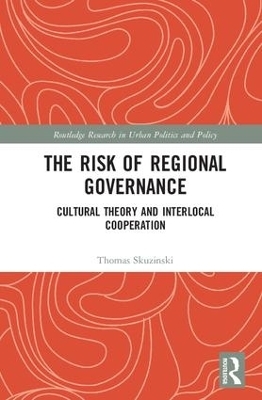
The Risk of Regional Governance
Routledge (Verlag)
978-1-138-23575-5 (ISBN)
Creating metropolitan regions that are more efficient, equitable, and sustainable depends on the willingness of local officials to work together across municipal boundaries to solve large-scale problems. How do these local officials think? Why do they only sometimes cooperate? What kind of governance do they choose in the face of persistent problems?
The Risk of Regional Governance offers a new perspective on these questions. Drawing on theory from sociology and anthropology, it argues that many of the most important cooperative decisions local officials make—those about land use planning and regulation—are driven by heuristic, biased reasoning driven by cultural values. The Risk of Regional Governance builds a sociocultural collective action framework, and supports it with rich survey and interview data from hundreds of local elected officials serving in the suburbs of Detroit and Grand Rapids, Michigan. It is a story of the Rust Belt, of how local officials think about their community and the region, and—most importantly—of how we might craft policies that can overcome biases against regional governance.
Thomas Skuzinski is Assistant Professor of Urban Affairs and Planning at the School of Public and International Affairs at Virginia Tech University. He holds doctoral and master degrees from the University of Michigan, and a law degree from Michigan State University. His work uses a sociological institutionalist lens to examine how the rules, norms, and cultures in which local government actors are embedded shape metropolitan governance.
1. Introduction. 1.1 Opting out 1.2 Governing metropolitan regions 1.3 The legitimacy of reform 1.4 Reform as a transaction 1.5 The limitations of economizing 1.6 Theoretical perspectives on metropolitan governance 1.7 The goals of the book 1.8 Evidence from metropolitan Michigan 1.9 The plan of the book 2. Governing the Region through Cooperation 2.1 The Manchester Community 2.2 The difficulty of structural reforms 2.3 The limitations of state and federal intervention 2.4 Distinguishing cooperation 2.5 Enabling cooperation 2.6 Awareness of the law 2.7 Conclusion 3. Beyond Economizing 3.1 Transaction cost economizing 3.2 Cooperation as a transaction 3.3 The individual in the local government organization 3.4 Some conceptual issues 3.5 Maintaining systems versus creating lifestyles 3.6 When reform seems irrational 3.7 Conclusion 4. Sociocultural collective action 4.1 Introduction 4.2 Revisiting rationality 4.3 Individuals and institutions 4.4 The appropriateness of regional reform 4.5 An illustration 5. Investigating Rules and Norms 5.1 Introduction 5.2 Economizing and reciprocity in preference formation 5.3 The norm of responsiveness in local government 5.4 The treatment of responsiveness in economizing studies 5.5 Evidence of political legitimizing 6. Cultural Legitimizing 6.1 From gay rights to gun control to governance 6.2 Grid-group cultural theory 6.3 Reconciling cultural theory with rational choice institutionalism 6.4 Connecting dispositions to governance 6.5 The cultural dispositions of local elected officials 6.6 Dispositions and partisan identity 6.7 Evidence of cultural legitimizing 6.8 Conclusion 7. Conclusion 7.1 Avenues for policy reform under legitimizing 7.2 Dealing with cultural pluralism through de-biasing 7.3 The prospects for regional governance through voluntary interlocal cooperation
| Erscheinungsdatum | 11.10.2017 |
|---|---|
| Reihe/Serie | Routledge Research in Urban Politics and Policy |
| Zusatzinfo | 15 Tables, black and white; 16 Line drawings, black and white; 16 Illustrations, black and white |
| Verlagsort | London |
| Sprache | englisch |
| Maße | 152 x 229 mm |
| Gewicht | 417 g |
| Themenwelt | Geisteswissenschaften ► Psychologie ► Sozialpsychologie |
| Naturwissenschaften ► Geowissenschaften ► Geografie / Kartografie | |
| Sozialwissenschaften ► Politik / Verwaltung ► Staat / Verwaltung | |
| Sozialwissenschaften ► Soziologie | |
| ISBN-10 | 1-138-23575-X / 113823575X |
| ISBN-13 | 978-1-138-23575-5 / 9781138235755 |
| Zustand | Neuware |
| Haben Sie eine Frage zum Produkt? |
aus dem Bereich


